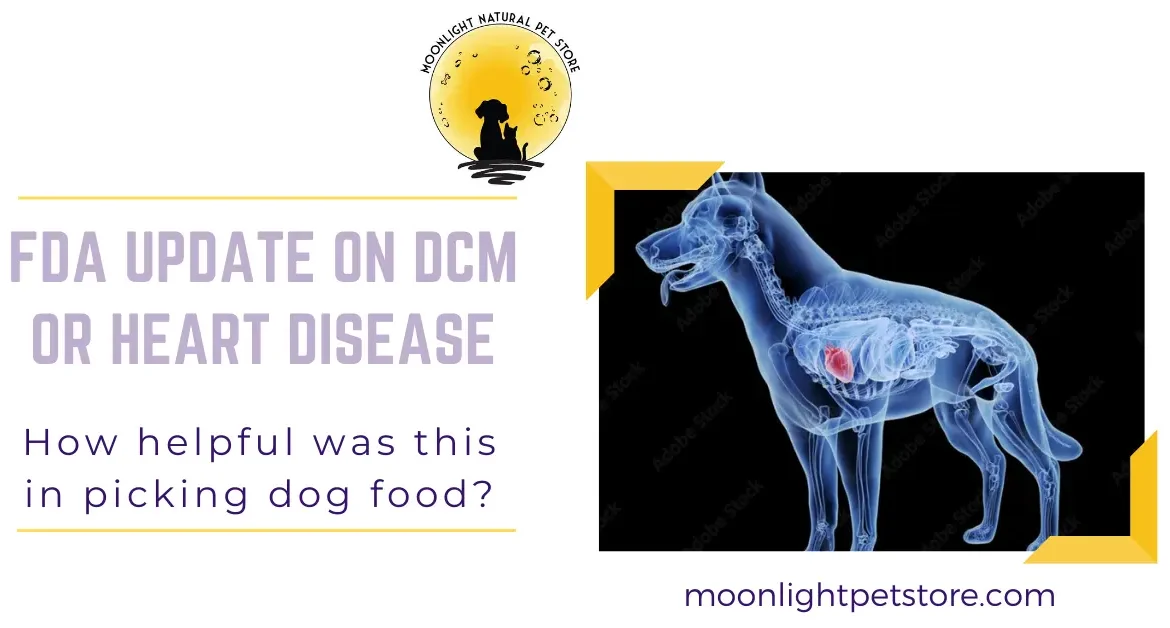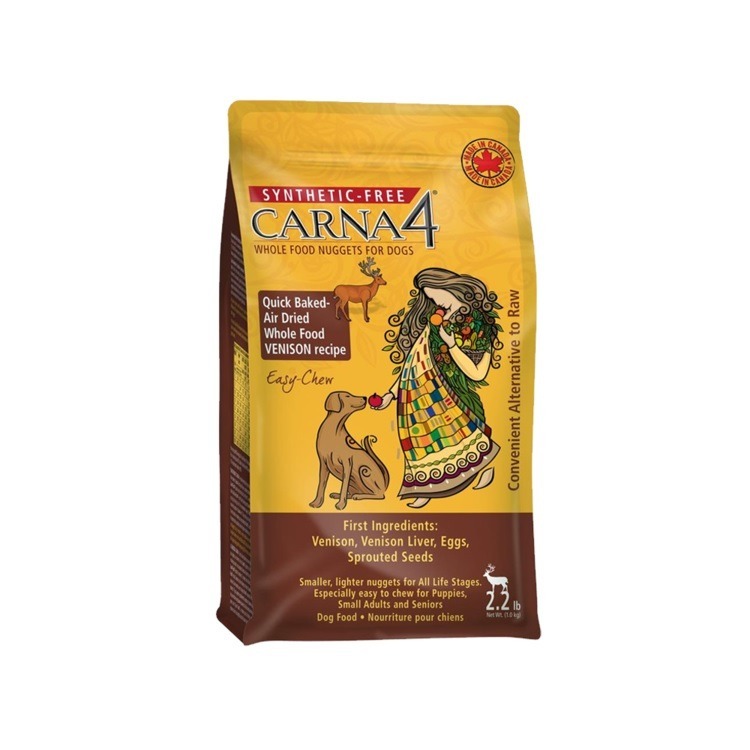
Latest FDA Update on Food-Related Dog Heart Disease (DCM) & What Pet Parents Should Do
What’s the Real Story Behind the FDA’s 2025 Update on DCM?
Since our last blog on DCM (dilated cardiomyopathy), the public has shifted consumer purchases to grain containing products for dogs. This was due to the FDA announcement in 2018 that grain-free pet food was associated with non-hereditary dog heart disease.
Since then, the FDA has released several updates with less fanfare than the original announcement. Their latest public statements show that the matter is far more complex than earlier headlines suggested.
Here’s what the FDA now says (and what that means for you):
No proven single “culprit” ingredient.
While many of the reported DCM cases involve diets high in legumes (“pulses” such as peas or lentils), both grain-free and grain-containing diets have been reported.
The FDA is not sure yet how diet interacts with other risk factors like genetics, nutrient bioavailability, or how pet food is processed.
No mandatory recalls — but ongoing investigation.
The FDA has not determined that any specific diet is definitively “unsafe.” Instead, they continue to call for more research and collaboration with veterinarians, nutritionists, and pet food makers.
There were possible financial ties between the whistle-blower vets & grain-inclusive pet foods
A 2022 journalist investigation found the “veterinarians who prompted the FDA to consider diet have financial and other ties to the leading sellers of grain-inclusive pet foods.”
What is DCM or Dog Heart Disease?
The College of Vet Medicine at Cornell University defines Canine Dilated Cardiomyopathy (DCM) as “a primary disease of cardiac muscle that results in a decreased ability of the heart to generate pressure to pump blood through the vascular system.”1
Basically, the heart gets larger and the walls thinner so that pressure needed to pump blood elsewhere is reduced.
What is the New FDA Update on DCM?
We are going to extract verbatim a few points in the the new FDA update- “Questions & Answers: FDA’s Work on Potential Causes of Non-Hereditary DCM in Dogs.”
Despite being the more important points, these are at almost the end of the Q&A. Basically, the FDA did not conduct a robust study before announcing in 2018 the potential cause of non-hereditary dog heart disease
We’ll underline part of their wording in red.
6. Do the diets associated with cases of non-hereditary DCM appear to have any commonalities?
Most of the diets associated with the reports of non-hereditary DCM have legume seed ingredients, also called “pulses” (e.g., peas, lentils, etc.), high in their ingredient lists (although soy is a legume, we did not see a signal associated with this ingredient). These include both “grain-free” and grain-containing formulations. Legumes, including pulse ingredients, have been used in pet foods for many years, with no evidence to indicate they are inherently dangerous, but analysis of data reported to CVM indicates that pulse ingredients are used in many “grain-free” diets in greater proportion than in most grain-containing formulas. FDA has asked pet food manufacturers to provide diet formulations so we can further understand the proportions of ingredients in commercially-available diets and possible relationships with non-hereditary DCM.
The FDA does not know the specific connection between these diets and cases of non-hereditary DCM and is continuing to explore the role of genetics, underlying medical conditions, and/or other factors.

7. Is FDA planning to continue naming the brands most associated with cases?
No, we are not planning to update the commonly reported brands, as we are aware that several pet food companies have adjusted diet formulations since our initial announcements about DCM. We have asked pet food manufacturers to share diet formulation information, which could substantially benefit our understanding of the role of diet in these cases. We continue to encourage pet owners to discuss their animals’ diets with their veterinarians.
8. Is this an issue with only grain-free diets or diets containing legumes or pulses?
No. FDA has received reports of non-hereditary DCM associated with both grain-free and grain-containing diets. Most of the diets associated with reports of non-hereditary DCM have non-soy legumes and pulses (e.g., peas, lentils, etc.) high in their ingredient lists. However, it is important to note that legumes and pulses have been used in pet foods for many years, with no evidence to indicate they are inherently dangerous. CVM’s data show that pulse ingredients are likely used in many “grain-free” diets in greater proportion than in most grain-containing formulas.
What Does the New FDA Update on Dog Heart Disease Mean?
Well 2 things really.
- The FDA doesn’t know what the cause of non-hereditary dog heart disease is. Although they said very early on it was grain-free diets, they biased their data collection to grain-free diets.
- They rectified this error in this Q&A. They however did not take the same media based approach to announce that dog heart disease can be caused by grain diets as well.
- It is possibly legumes and pulses used in both grain-free and grain diets that may be causing this non-hereditary dog heart disease. However, in #8 above, the FDA notes these have been used in pet food for many years with no evidence of being inherently dangerous.
- Basically, the FDA has no clue whether it is legumes or pulses despite their consent to this ingredient use in pet food.
- If they find that it is legumes and pulses, they are tentatively going to take credit for naming grain-free diets as the culprit. This is due to the fact that grain-free diets contain a greater proportion of pulse ingredients.
It is understandable that we do not know what is causing non-hereditary dog heart disease. It is fair to say that it is probably associated with legumes and pulses.
However, until causality is proven, it was premature and bad practice to segment grain-free and grain containing diets if “the apparent association (of grain-free and DCM) may be spurious.”
Also of note, potato was initially implicated as a potential cause but does not seem to have made it into the Q&A now.
What Should Pet Parents Do to Avoid Non-hereditary Dog DCM?
As we’ve said in our prior blog on DCM, here are a few things to consider:
- Don’t panic-switch foods. Unless your pet food was on the initial list.
- Choose a whole foods-based dog food. Look for pet foods with quality ingredients and biologically appropriate protein sources.
- Opt for oven baked, if you prefer dry dog food.
- If you prefer better kibble brands look for brands that have a lot of protein as the first few ingredients. (Some pet foods supplement their protein by using legumes instead of good quality and quantity of meat.) Carna4 and Nature’s Logic are great dry food brands that were not implicated in the DCM causing foods.

- For raw fresh pet food. Opt for brands that use a lot of heart, muscle meat and organs (especially heart and liver). Look for a low-fat option in your raw pet food as lamb and duck were implicated. Stick with good brands as not all pet foods are created equal.
- Note that too much liver can cause hypervitaminosis A. If the raw food uses lots of liver and you feed your dog liver treats, you may be unwittingly causing a problem.
- Rotate your proteins for pet food. Switch between pet food brands that meet high standards based on your research.
- Based on the FDA granular data, some grain-free diets were shown to reverse the diet-DCM e.g. Ziwi Peak so it may not be an issue of grain-free at all. (You can use Ziwi Peak as a topper as it is pricier.) K9 Natural Freeze Dried as a meal topper or supplemental feeding. These dog foods tend to have mussels and seafood in the formulation.
- Supplement with omega-3 fatty acids or ubiquinol. This is a good preventative measure for DCM.
- Alternatively add seafood to your pet’s meal once a week. An example could be mussels or sardines (don’t get the canned ones in oil).

Wishing you all the best!



I will continue to point other pet owner’s towards this evidence. I’ve seen vets handing out flyers warning owners of grain-free diets still and it is incredibly frustrating to say the least. Thanks for making this information accessible!
🙂